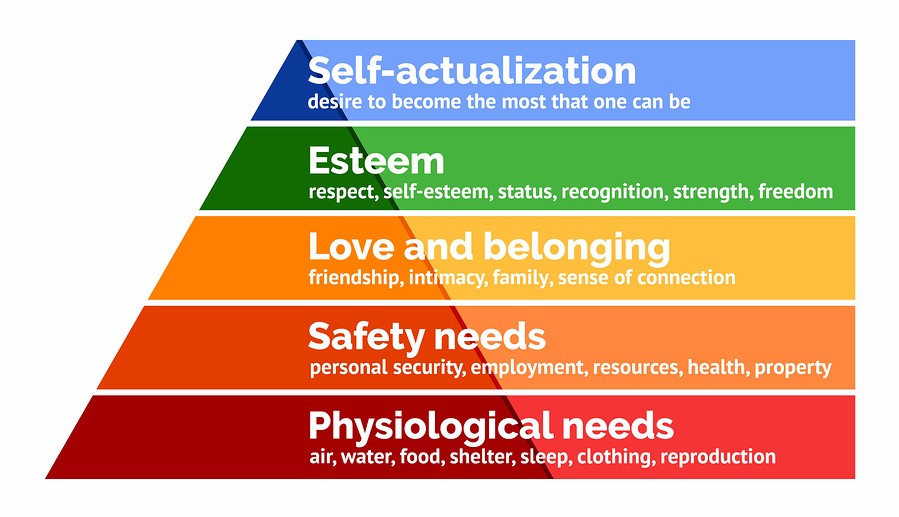Abraham Maslow’s Theory of Human Motivation has stood the test of time. Devised in 1943, Maslow’s Hierarchy of Needs framework is still actively applied by business leaders looking to create a positive and empowered workplace for employees.
But, while business owners are readily applying the theory for the benefit of others and their business, they’re ignoring their individual needs. That needs to change. The very reason you became a business owner in the first place was so that you could reach the pinnacle of Maslow’s ‘mountain’: ‘Esteem’ and ‘Self-actualisation’. Am I wrong?
If your current way of working doesn’t allow you to meet Maslow’s Hierarchy of Needs – or at least seek to attain them – then what are you in it for? Apologies if that question is jarring, but sometimes I think they need asking when we’re discussing our individual lives.
As earnest as it sounds, a business is not sustainable if it’s serving everybody’s needs but yours. At some point, you’ll either burn out or just lose the will to keep it running. So, for the sake of your individual needs and the needs of the business, it’s time to work out what you need to do to make your ascent up the hierarchy:
1. Physiological: Food, Water, Warmth, Rest
At the bottom of Maslow’s Hierarchy of Needs pyramid are those things necessary for basic survival. You’d like to think that business owners would have no problem here, but a lack of time can result in food, water and rest taking a backseat – especially sleep, which is often seen as something that can be forfeited for the sake of keeping the business running.
But, exhaustion can lead to poor decisions, which are to the detriment of the business. It can also lead to irritability, which often rears its head at home and your personal life starts to suffer.
If you want to ensure your physiological needs are met, it might be time to find somebody who can support you in running your business. Your body will thank you for it.
2. Safety Needs: Security, Safety
This level in the pyramid means safety that’s both literal (protection from the elements, absence of violence, and financial security, for instance) and more abstract (law and order, political stability, etc.).
For a business owner, it’s the financial security that will typically be of most concern here. As well as creating financial freedom for their business, they also need financial freedom for themselves, so that they can achieve their personal objectives.
However, if you were to bring in a financial director to help plan finances and manage cash flow, they would only be concerned with looking at it all from the perspective of the business.
What you need is a finance director who can look at the business finances through the eyes of the owner.
3. Loving/Belonging: Intimate Relationships, Friends
Running a business and maintaining the relationships that matter to you can feel impossible. People will make allowances for the lack of time that you can give them in the short term – but they probably won’t accept it in the long term.
It’s never too late to re-address the balance between work and family life. But, it requires a step-change in the way you work. That might mean you bring in a partner to share the workload – or you empower your team and forgo the micro-management. It’s a big decision to make and you might benefit from somebody who can look at your business with objective eyes to see what would be your best option financially and for your peace of mind.
4. Esteem Needs: Prestige and Feelings Of Accomplishment
In many people’s eyes, running a business is the pinnacle of professional achievement. But, for many business owners, it can feel like failure.
Every business owner has their own definition of success and failure. This is why it’s so important that a business is built in the image of its owner. If a business doesn’t go on to fulfil that vision, it can feel like failure; even if the company accounts tell a different story.
Growth has to start with you – growing the individual to grow the business. It’s the only way you can attain feelings of accomplishment.
5. Self-actualisation: Achieving One’s Potential, Including Creative Activities
Maslow defined this level of Maslow’s Hierarchy of Needs as the desire to accomplish everything that one can and to become the most one can be. While the other tiers are fairly generic and commonly rooted in human nature, this one concerns what is unique in the self; so, one person’s self-actualisation is unlikely to look anything like the next person’s.
It’s about having a sense of purpose, knowing you are where you should be, doing what you should be doing. When you started your business, that sense of purpose was undisputed. Now you are further along in your journey, does it remain?
If you feel like you’ve lost sight of your sense of purpose, it’s time to do something about it – unfortunately it won’t come back into focus without you adjusting the lens. In fact, sometimes it requires somebody else to bring back some clarity. Someone who’s been there, done it.






